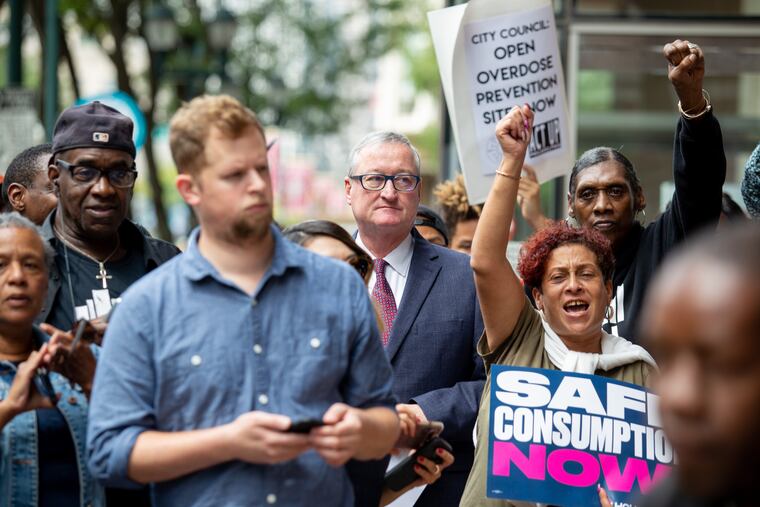Philadelphia’s landmark supervised-injection site ruling has boosted such efforts in other cities
Experts say the case sets an important precedent in a legal fight that’s gained considerable momentum as the opioid overdose crisis has killed tens of thousands.

The federal court ruling in favor of Philadelphia’s proposed supervised-injection site doesn’t apply to the handful of other cities that have floated the idea over the last few years. But backers of the harm-reduction concept around the country say they’ve been galvanized by the ruling, even as other U.S. attorneys have indicated they would try to block the sites.
In any case, experts say, the Philadelphia ruling sets an important precedent in a legal fight that’s gained momentum as the opioid overdose crisis has killed tens of thousands of Americans in recent years. The sites are places where people in addiction can use the drugs they bring with them under medical supervision so they can be revived if they overdose, and also can access treatment and other health services.
Scott Burris, a Temple University law professor who directs the school’s Center for Public Health Law Research, called the ruling “absolutely huge," even if it directly applies only to the Eastern District of Pennsylvania.
If other federal court cases are filed over proposed sites, “any judge who ignores [this ruling] is going to be at risk of looking like a know-nothing,” he said. Burris, who has written extensively in support of sites — and the legal challenges they face — called U.S. District Judge Gerald A. McHugh’s ruling ”earnest, careful, and morally serious."
“The precedent here is in the careful reasoning, and in the nonjudgmental, evidence-based approach,” he said. “What we need most in all of these kinds of cases is clear thinking. From a big-picture public health law perspective, a lot of us are always happy when judges look at evidence about what works and what doesn’t, about the actual nature of a health problem, and apply the law to those facts."
U.S. Attorney William M. McSwain, who argued the case personally in court, filed suit claiming the site would violate the 1984 “crack house statute.” McHugh ruled, however, that a law meant to stop drug dens could not possibly also apply to a public health intervention.
Several other states and cities had already thrown their support behind Philadelphia’s efforts.
In July, attorneys general from the District of Columbia, Colorado, Delaware, Michigan, Minnesota, New Mexico, Oregon, and Virginia filed friend-of-the-court briefs in the federal lawsuit against Safehouse, the nonprofit planning to open a site in Philadelphia. They argued that states “need the freedom to implement innovative treatment programs to save lives."
With McHugh’s ruling in hand, activists in New York took the opportunity to call on Gov. Andrew Cuomo to support a site, the blog Gothamist reported. Mayor Bill de Blasio had announced last year that he planned to open sites in New York City, but the effort has stalled at the state level.
City officials in Seattle and San Francisco — the two other cities that have come closest to opening sites — said they were closely studying the ruling. Some activists in Seattle told a local television station they wanted to see mobile sites open.
In San Francisco, “the city attorney’s office has begun poring over the ruling to see if it might provide the legal arguments necessary to make it easier" to open a site," the San Francisco Chronicle reported.
A state bill to authorize supervised injection sites in California was vetoed last year by then-Gov. Jerry Brown, but the Chronicle reported that a new bill has been introduced in the state legislature, and at least one city lawmaker is considering pushing a local bill sanctioning a site.
In Massachusetts, where mayors of several cities have contemplated opening sites, state lawmakers have been debating the idea for the last several months. Last week, U.S. Attorney Andrew Lelling, the top federal prosecutor in the District of Massachusetts, said he would sue to block any attempts to open a site.
And even in Philadelphia, there’s still much to be done before a site opens. Safehouse officials have said they believe the biggest legal hurdle is out of the way, but they’re waiting for further guidance from McHugh. McSwain, meanwhile, has said he will continue to oppose the decision in court.